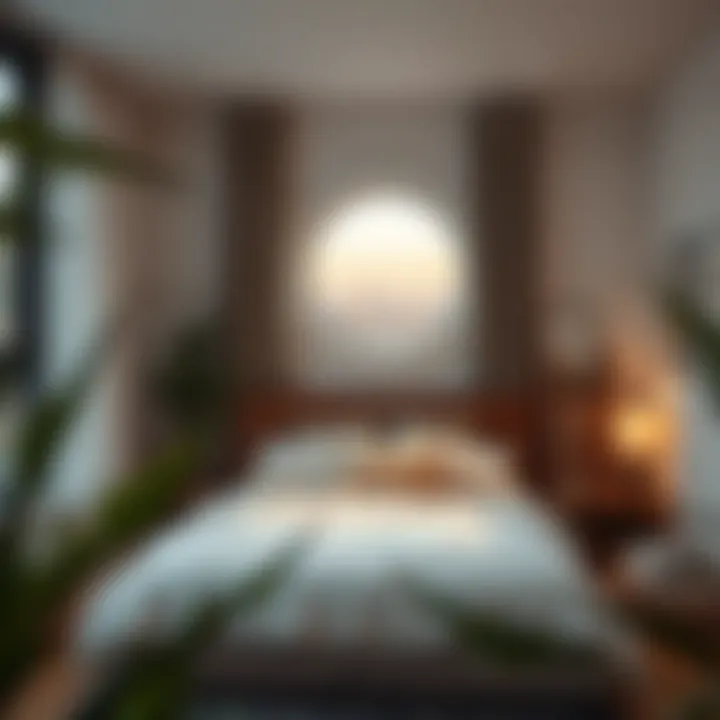Feng Shui Principles for a Balanced Bedroom Environment


Intro
In today's fast-paced world, where distractions seem to abound, creating a peaceful sanctuary in your bedroom is paramount. This space should not only be a place for rest but also a haven that contributes to mental clarity and emotional balance. Feng Shui, an ancient Chinese practice, offers valuable insights into arranging your bedroom to cultivate harmony and well-being. By thoughtfully considering the layout, colors, and natural elements, you can enhance the energy flow in your space, leading to improved mental wellness and a sound night's sleep.
Understanding Mental Health and Well-being
What is Mental Health?
Mental health refers to our emotional, psychological, and social well-being. It affects how we think, feel, and act in our daily lives. Good mental health is essential at every stage of life, from childhood to adulthood. It’s not just the absence of mental illness; it’s more about how individuals cope with the stresses of life, interact with others, and make decisions.
The Importance of Prioritizing Mental Well-being
Prioritizing mental well-being is crucial, as it directly affects our overall health. When our mental state is in balance, we can thrive personally and professionally. In contrast, neglecting it can lead to issues like anxiety, depression, and stress. Incorporating feng shui principles into your bedroom can act as a proactive measure to enhance your mental space, reminding you to care for your inner self amidst life's chaos.
Common Mental Health Challenges and Disorders
A variety of challenges can impact mental health, including:
- Anxiety Disorders: Characterized by excessive worry or fear that can disrupt daily activities.
- Depression: A persistent feeling of sadness that can affect one's energy levels and sense of worth.
- Stress: Often tied to work, relationships, or other external factors, it can lead to burnout if not managed.
If you notice signs of these issues, think of your bedroom redesign as a first step towards recovery.
Strategies for Improving Mental Health
Self-care Techniques and Practices
Engaging in self-care is imperative. Simple practices like journaling, reading, or meditative moments can enhance your daily routine. In feng shui, placing serene images or calming colors in your bedroom might uplift your spirit and induce relaxation.
Building Resilience and Stress Management
Building resilience includes developing a toolbox of strategies to cope with stress. This might involve creating a dedicated relaxation corner in your bedroom—imagine having a cozy chair where you can unwind with a book. The design should be so inviting that you can’t resist taking a moment for yourself.
Seeking Professional Help: Therapy and Counseling
Sometimes, seeking professional help is the best course of action. Therapy and counseling can provide you with the tools to handle life's stresses, and having a comfortable and serene space can aid in the process. Design your bedroom to be a therapeutic retreat, encompassing aspects of feng shui that resonate with you.
Finding Balance in Life
Healthy Lifestyle Choices: Diet, Exercise, and Sleep
A balanced lifestyle can be achieved through healthy diet choices, regular exercise, and sufficient sleep. Your bedroom should facilitate rest and relaxation, promoting better sleep patterns—consider using calming colors like light blue or soft green to create a sleep-conducive atmosphere.
Mindfulness and Meditation Practices
Incorporating mindfulness and meditation can help ground you in the moment. Create a nook in your bedroom where you can sit in peace. This quiet area should be free of clutter, allowing the mind to wander without distractions.
Setting Boundaries and Managing Time Effectively
Setting boundaries is essential for mental clarity. Establishing a clear division between work and rest can enhance your emotional health. Ensure your bedroom remains a distraction-free zone, perhaps by keeping electronics at bay.
Enhancing Personal Development
Goal Setting and Productivity Tips
Goal setting is vital for personal growth. Create a vision board to pin your aspirations in sight. Utilize feng shui by placing your board in a command position where it can be seen first thing in the morning.
Building Healthy Relationships and Social Connections
Nurturing relationships with family and friends brings joy and fulfillment. Design your bedroom with space for open dialogue; perhaps a small couch can invite friends over for meaningful conversations.
Practicing Gratitude and Positivity
Practicing gratitude has remarkable effects on mental health. Consider a gratitude journal on your nightstand, a cozy spot to reflect on the positivity in your life, while feng shui-inspired decor can reinforce these uplifting feelings.
Tips for Maintaining Mental Well-being
Strategies for Preventing Burnout
Preventing burnout involves understanding your limits. Regularly assess your workload and create zones in your bedroom that encourage rest and relaxation without distractions from daily life.
Coping with Challenges and Setbacks
When setbacks occur, having a supportive environment can aid recovery. Frequent small changes in the bedroom layout using feng shui ideas can symbolize new beginnings and help manage challenges from a fresh perspective.
Creating a Supportive Environment
A supportive environment is necessary for fostering well-being. Decorate with soothing colors, incorporate plants to introduce nature, and arrange furniture so it invites comfort over chaos.
"The art of feng shui is not merely about objects or space; it is about the energy that flows around us and how it influences our lives."
By attending to these various aspects of mental health in conjunction with feng shui principles, you can craft a space that not only nurtures your psyche but also enhances your overall quality of life. Transforming your bedroom into a tranquil retreat can be your first step in prioritizing well-being.
Understanding Feng Shui
Feng Shui is not just about harmonious decoration; it's a profound philosophy rooted in ancient Chinese practices. It emphasizes the flow of chi, or life energy, throughout a space, particularly the bedroom, where individuals seek rest and rejuvenation. Understanding the principles of Feng Shui can transform a room into a sanctuary, paving the way for improved mental health and emotional balance. This section will delve into the core concepts that underpin Feng Shui, clarifying its importance in creating a bedroom that promotes well-being.
The Concept of Chi
Chi is the life force that flows through everything—nature, objects, and especially people. In the context of a bedroom, chi needs unobstructed pathways to circulate freely to create a calming environment. When chi flows smoothly, it fosters a sense of peace which is crucial for quality sleep and relaxation. So, the placement of furniture, the choice of colors, and the incorporation of natural elements all play vital roles in ensuring chi's energetic dance is uninterrupted. An unwelcoming arrangement or excessive decor can stifle this energy, leaving occupants feeling restless and fatigued. Understanding chi is the first step towards a restful environment, making it essential to layer the design choices with this principle in mind.


The Five Elements
Feng Shui revolves around five elements—Wood, Fire, Earth, Metal, and Water—each symbolizing different aspects of life and carrying unique attributes that influence the bedroom’s atmosphere. Let's break these down:
Wood
Wood symbolizes growth, vitality, and creativity. It brings a sense of freshness and energy into the bedroom. You might think about incorporating wooden furniture or decor items like plants. These elements not only add an organic touch but also resonate with the expansive qualities of Wood. A downside? Too much Wood can lead to chaos or overwhelm if not balanced properly—meaning careful integration is key.
Fire
Next up is Fire, the element of passion and transformation. Strategically placed candles or warm lighting can foster an inviting and warm environment. This might be just the ticket for couples looking to spice up their relationship, providing a cozy backdrop. However, be cautious with the use of Fire; too much can create agitation and disrupt tranquility, so it should be used thoughtfully.
Earth
Earth grounds the energy and represents stability and nourishment. Earthy tones, such as tans and gentle creams, can be painted on walls or featured in bedside decor to promote a nurturing environment. The incorporation of ceramic or clay pieces can enhance this grounding effect, making Earth essential for creating a reliable, calming space. Yet, an overabundance can lead to stagnation in energy flow; a subtle touch is often more effective.
Metal
Metal signifies clarity, precision, and structure. Using metal frames or accents—perhaps in headboards or light fixtures—instills sophistication and sharpness in design. The key contribution of Metal is its ability to help clear mental clutter, making it easier to chill out and focus on relaxation. Yet, it’s important to strike a balance, as too much Metal can feel cold or detached, which doesn't fare well in a space meant for rest.
Water
Finally, Water symbolizes fluidity and abundance. Introducing water elements—like aquariums or art featuring water scenes—can create calm and peace. It's a visual representation of tranquility, encouraging a sense of relaxation before sleep. However, one should be cautious; mismanagement of Water can lead to too much movement and chaos in energy, disrupting restfulness.
The Bagua Map
The Bagua Map is a powerful tool used in Feng Shui to analyze the energy of a space. It divides a room into nine areas, each connected to different aspects of life, such as love, health, and career. For a harmonious bedroom, aligning your space according to the Bagua Map can enhance personal goals, making each corner serve a purpose. By understanding how each area interacts with your life, you can consciously create an environment that supports your aspirations while ensuring that the energy flows positively.
By embracing these principles, one can start to see their bedroom not just as a place to sleep, but as a sanctuary—an opportunity to nurture oneself through the intentional design of their environment.
Significance of the Bedroom in Feng Shui
The bedroom is more than just a place to sleep; it's a sanctuary for rest and rejuvenation. In feng shui, the significance of the bedroom cannot be overstated. It embodies the principles of harmony and balance, as the energy within this space directly influences one's overall well-being. A well-designed bedroom promotes not only restful sleep but also a nurturing environment where individuals can thrive emotionally and physically.
Restorative Space
In the hustle and bustle of daily life, the bedroom serves as a restorative space where individuals recharge. It should reflect tranquility and serenity, making it essential to create an environment free from distractions. By focusing on design elements such as soft colors, minimal clutter, and comfortable furnishings, one can cultivate a space conducive to relaxation. The bed, being the central feature of this room, should be positioned thoughtfully to promote a feeling of safety and comfort. This restorative space is vital as it allows for productive sleep cycles, which are crucial for mental clarity and emotional stability.
Impact on Relationships
The feng shui of a bedroom can significantly influence the dynamics of relationships, whether romantic, familial, or friendships. When the space embodies balance, it fosters a sense of connection and intimacy. Elements like paired nightstands and artworks that resonate with both partners can promote unity. Moreover, ensuring that the bed is accessible from both sides—avoiding barriers and clutter—enhances harmony. This way, the bedroom becomes a sacred place where relationships can flourish, supported by an environment that nurtures bonding and trust.
Influence on Mental Well-being
A bedroom thoughtfully designed according to feng shui principles can have profound effects on mental health. It is known that physical surroundings impact mood and outlook; hence, a space that is calming and organized can help quell anxiety and foster positive thoughts. Incorporating natural elements such as plants can improve air quality, while adequate lighting can create a balanced atmosphere. While colors also play a pivotal role—muted tones can induce relaxation and peace—decoration choices that reflect personal identity can contribute to a deeper emotional connection with the space. Engaging with a harmonious environment allows for mental stability, enhancing everyday life.
"A peaceful bedroom is a breeding ground for a peaceful mind."
The significance of the bedroom in feng shui cannot be preached enough. Each curated aspect, from arrangement to color selection, contributes to an enhanced quality of life, influencing emotional health and interpersonal relationships. As such, the bedroom becomes a canvas for establishing one’s personal sanctuary, essential for holistic wellness and happiness.
Layout Considerations
When it comes to crafting a harmonious bedroom grounded in Feng Shui, layout considerations are paramount. They not only dictate the flow of energy, or chi, but also influence how one feels about the space. A thoughtfully arranged bedroom can be a tranquil retreat, allowing an individual to rest, reflect, and rejuvenate. In this section, we will delve into bed placement and furniture arrangement, elucidating how each choice contributes to an atmosphere of calm and balance.
Bed Placement
Command Position
The command position is a foundational aspect of Feng Shui bedroom design. This positioning requires the bed to be placed so that the occupant can see the entrance while resting, ideally with a wall behind the bed for support. This setup instills a sense of security and control over the space. It's a choice that resonates with many because it creates a balance between protection and openness, allowing for a peaceful atmosphere.
The unique feature of the command position lies in its strategic placement. Positioning the bed in this manner not only optimally utilizes space but also aligns energy flow. A disadvantage, however, might emerge with certain room sizes where this ideal setup may not be feasible, potentially leading to feelings of restlessness.
Alignment with Doorway
Alignment with the doorway is another fundamental factor in enhancing harmony within the bedroom. Ideally, the bed should be placed diagonally opposite the door. This alignment allows occupants to be aware of who enters, fostering a sense of safety, which can lead to deeper relaxation and sleep.
While this alignment is beneficial for creating a protective bubble, it’s essential to maintain a clear view without being in direct line with the door. Being too close can expose one to a constant flow of energy, potentially disrupting rest. Thus, care must be taken when choosing this option, bearing in mind the room's overall dimensions.
Clear Pathways
Another aspect of bed placement revolves around ensuring clear pathways around the bed. This principle is vital as it promotes unobstructed energy flow and encourages mobility within the space. A clutter-free area around the bed contributes to feelings of tranquility and ease.
The unique feature of maintaining open pathways is that it invites movement and the circulation of chi. This layout creates an environment where energy, considered to be beneficial both physically and emotionally, can flourish. However, neglecting to maintain these pathways, possibly due to overly bulky furniture or clutter, can stifle energy, making one feel boxed in and restricted.
Furniture Arrangement
Balance and Symmetry
Balance and symmetry play critical roles in the overall feel of the bedroom. By arranging furniture in a balanced manner, one can enhance visual harmony and create a sense of stability. Two nightstands flanking the bed can symbolize equality and partnership, crucial elements for those looking to bolster relationships.
The essence of balance is often linked with the idea of tranquility. On the flip side, achieving perfect symmetry might be cumbersome in uniquely shaped rooms. Thus, a degree of fluidity in adjustments can keep the space feeling natural rather than forced.
Clutter Minimization
The act of clutter minimization goes hand in hand with a harmonious layout. Reducing clutter helps to foster a peaceful mind and a serene environment. This can be achieved through storage solutions, keeping only what is necessary and meaningful. The mistake often made is the accumulation of items that no longer serve a purpose or hold emotional value.
Minimizing clutter not only makes the space visually appealing but also energetically uplifting. However, one must stay vigilant, as clutter can creep back in over time, disrupting the clarity and energy balance achieved.
Functional Zoning
Functional zoning refers to the organization of the bedroom’s space based on various activities. For example, a reading nook or designated workspace within the bedroom can define and separate different energy zones. This helps maintain focus on specific tasks, whether it be relaxation or work.


The hallmark of functional zoning lies in its adaptability. This can lead to an environment that resonates with one’s personal needs. Yet, careful planning is essential to avoid overcrowding the space and creating chaotic energy that can detract from the tranquil ambiance desired in a bedroom.
"Creating a harmonious layout is like conducting an orchestra; every piece needs to play its part for the overall melody to flow gracefully."
In summary, layout considerations in a Feng Shui bedroom are pivotal in establishing a space that nurtures well-being. By thoughtfully arranging bed placement and furniture, it is possible to create a sanctuary that not only looks appealing but also promotes restful sleep and emotional balance.
Color Selection for Tranquility
In the realm of feng shui, color selection plays a pivotal role in creating a tranquil bedroom environment. Colors possess unique energy, influencing how we feel and interact with our personal space. The right color scheme can enhance relaxation, promote restful sleep, and even bolster mental clarity. When selecting colors for your bedroom, consider hues that not only please your eye but also serve to calm the mind and spirit.
Calming Neutrals
Neutral shades like beige, taupe, and soft grays are often favored in feng shui because they embody balance and simplicity. These tones create a serene background that allows other elements in the room, such as decor and textiles, to shine without overwhelming the senses. The presence of calming neutrals fosters a sense of stability and comfort, acting as a gentle embrace that can help individuals unwind at the end of a long day.
Consider using a creamy beige for your walls paired with darker wood furnishings. This way, the room feels grounded yet inviting, enhancing the overall sense of harmony and balance.
Soft Pastels
Soft pastels, including shades of lavender, mint green, and light peach, hold the power to uplift while also soothing the spirit. Each pastel shade brings its own subtle energy; for example, lavender embodies tranquility and is said to reduce stress, making it a perfect choice for sleep spaces.
Embracing soft pastels in bedding or decorative cushions can create a gentle visual story that invites relaxation. It is essential to strike a balance though; too many pastel colors can feel whimsical rather than serene, so it’s wise to integrate these colors subtly, mixing with calming neutrals to achieve a complementary effect.
Bold Accents
While soft colors dominate the feng shui palette for tranquility, bold accent colors can serve to bring vitality and inspiration into a bedroom. However, one must tread carefully here, as the wrong use of bold colors can disrupt the peaceful ambiance meant for restful slumber.
Red for Passion
Red is often associated with desire and passion, and when used appropriately, it can ignite energy in the bedroom. A touch of red—perhaps in a piece of artwork or a decorative throw pillow—can create a focal point that bolsters romantic energy. Still, its intensity needs to be balanced. Too much red may lead to restlessness, so consider using it sparingly—perhaps just in a framed picture or a stylish vase.
Blue for Calmness
Blue is a quintessential choice for those seeking tranquility and peace. It has a calming effect reminiscent of a clear sky or deep ocean water. Different shades of blue, from soft baby blue to deep navy, can bring a sense of expansiveness while also cooling the emotional climate of the room. Choosing blue for larger elements—like curtains or bedding—can make a significant impact on the room's overall vibe. It's also beneficial; this color is associated with restful sleep and rejuvenation, making it ideal for creating a restful haven.
"Color is the keyboard; the eyes are the harmonies; the soul is the piano with many strings." - Wassily Kandinsky
By weaving together these color elements—calming neutrals, soft pastels, and carefully placed bold accents—you create a balanced, inviting, and tranquil bedroom. Achieving this balance is essential for fostering an environment that contributes to overall well-being, inviting peaceful sleep and a rejuvenated spirit.
Incorporating Natural Elements
The inclusion of natural elements in a bedroom holds immense significance in feng shui, as it creates an environment infused with balance and serenity. Integrating these aspects into your space isn’t merely about aesthetics; it's fundamentally about enhancing your mental and emotional well-being. Each element—like plants, natural light, and water features—comes with its own distinct advantages and can play a pivotal role in promoting a harmonious ambiance, conducive to rest and rejuvenation.
Plants and Greenery
Air Purification
Plants are more than just decoration; they hold the power to purify the air within your space. Specific plants, such as spider plants and peace lilies, are champions of filtering out pollutants and improving indoor air quality. This is particularly advantageous for those with respiratory issues or allergies, making air purification a vital aspect of creating a healthier environment. You might ask yourself, "How much cleaner can the air actually be?" The truth is, introducing a bit of greenery can lead to not only cleaner air but also a refreshing feeling. A unique characteristic of air purifiers lies in their connection to nature, effortlessly marrying the indoors with the outdoors. However, it is essential to consider your ability to care for these plants; neglect could turn a beneficial aspect into a detriment.
Stress Reduction
Bringing plants into your bedroom serves as a natural antidote to life’s overwhelming stresses. The presence of greenery tends to evoke tranquility and a sense of calm, which is key when striving for emotional balance. Studies have shown that being around plants can lower cortisol levels—our body’s primary stress hormone. This is a significant advantage for anyone looking to carve out a sanctuary in their living space. On the flip side, it’s important to select plants that are low maintenance if you’re not keen on regular upkeep, as dying plants could worsen stress rather than alleviate it.
Natural Light
Maximizing Sunlight
Harnessing sunlight in your bedroom can drastically elevate your mood and energy levels. Sunlight is a natural source of Vitamin D, which is crucial for mental health. By maximizing sunlight exposure through well-placed windows or reflective surfaces, you not only brighten up the room but also encourage a more vibrant atmosphere. A key point to remember is that light affects your circadian rhythm, aiding your body in recognizing when it’s time to wind down and when it’s time to wake up. However, excessive direct sunlight can lead to overheating in summer, necessitating some thoughtful management of window treatments.
Controlling Glare
While sunlight is a friend, glare can be a foe, hindering your comfort and focus. Balancing the amount of light filtering into your bedroom is essential to maintain a cozy and functional space. Using sheer curtains can allow natural light to flood in while reducing harsh glare that can be distracting or even damaging to your furniture. This careful control of light not only enhances comfort but also supports the concept of a relaxed environment where stress subsides. However, it’s crucial to regularly adjust such treatments as the seasons change since the sunlight’s angle shifts throughout the year.
Water Features
Fountains
Adding a fountain can introduce a soothing auditory element to your bedroom. The gentle sound of flowing water promotes tranquility and can drown out more jarring noises from outside. It's also said that water signifies abundance and prosperity, linking this element to positive energy. Additionally, a fountain can serve as a striking visual centerpiece, instantly capturing attention. On a downside, fountains do require maintenance to ensure the water stays clean and flowing, which could be a deterrent for those seeking simplicity.
Decorative Bowls
Incorporating decorative bowls filled with water is another way to introduce a calming water element. Unlike larger fountains, these bowls require less maintenance and can be aesthetically versatile. They also symbolize fluidity and flexibility—qualities that can enrich your life. However, it’s essential to choose bowls wisely, as they should suit your overall decor and not become breeding grounds for pests.
Incorporating these natural elements into your bedroom isn’t just a style choice; it’s a lifestyle decision aimed at enhancing your well-being. Striking a balance between these elements can foster an atmosphere where harmony and tranquility reign, creating a true oasis for relaxation.
Textiles and Materials
When it comes to creating an inviting and balanced bedroom environment, the role of textiles and materials cannot be overstated. The choices you make in fabrics and materials can significantly affect both the aesthetics and the energy flow within this crucial space. Using well-selected textiles not only contributes to comfort but also aligns with the principles of feng shui, promoting relaxation and well-being.
Bedding Choices
Natural Fabrics
Natural fabrics like cotton, linen, and silk are ideally suited for bedding because they breathe easily and help regulate body temperature. Unlike synthetic materials, which can restrict airflow and lead to discomfort, these natural fibers allow your skin to breathe. This contributes to a more restful night’s sleep, which is essential for rejuvenation. One key characteristic of natural fabrics is their ability to absorb moisture, keeping the sleeping area dry and comfortable.
These textiles are also popular due to their ecological benefits; they are generally less harmful to the environment than their synthetic counterparts. However, it’s worth noting that natural fabrics may require more frequent washing and care to maintain their condition, which can be seen as a downside.
Comfort Levels
Comfort levels in bedding are paramount when considering feng shui principles. The overall softness, feel, and support offered by your bedding can directly influence your ability to relax. A crucial aspect of comfort is the choice of mattress and pillows, which should provide proper support for your body. Strong support reduces tossing and turning during the night, leading to deeper sleep.


Down alternative materials are well-liked for their balance of softness and support. Furthermore, one unique feature of comfort levels is the option for adjustable firmness in some mattresses. This can cater to individual preferences, allowing for a customized sleep experience. However, the trade-off might be that these adjustable sets can take a bit of time to configure properly.
Window Treatments
Selecting suitable window treatments is essential, as they can either enhance or disrupt the energy flow in your bedroom. Consider how each type accords with your feng shui goals.
Blackout Curtains
Blackout curtains are remarkably effective for promoting restful sleep. They block out external light, which can disturb your sleep cycle and affect overall well-being. This makes them a prime choice for any bedroom aimed at achieving tranquility. Additionally, by controlling the amount of light entering the room, blackout curtains create a cozy, cocoon-like atmosphere conducive to relaxation.
The downside is that they can sometimes feel heavy or oppressive, and they may not always blend well with lighter design schemes. However, the benefits often outweigh these aesthetics, especially if you get a good night’s sleep.
Light Fabrics
On the flip side, light fabrics for window treatments, such as sheer curtains, offer a different vibe. They allow natural light to softly filter into the space, creating a serene environment. This can enhance your mood during the day and connect you with the rhythm of the natural world outside. Light fabrics tend to create an airy feel, making a room seem larger, which aligns well with feng shui principles that advocate for openness and fluidity.
However, while beneficial in promoting natural light, they may allow too much light in at dawn or during overly bright days, which could disrupt your rest. Finding a balance between light and opacity is key to utilizing them effectively.
"The choice of textiles can make or break the energy flow in your bedroom. Consider both comfort and harmony in your selections.”
Personalization and Meaning
In the intricate world of feng shui, the bedroom isn't merely a space filled with furniture and decor; it's a personal sanctuary where energy flows, affecting our mood, rest, and overall well-being. This is where personalization plays a key role. When you infuse the space with elements of your identity, it not only enhances the aesthetic but also harmonizes your environment with your spirit.
Meaningful personalization encompasses thoughtful selections in colors, artwork, and belongings that resonate with your personal journey. It reflects your preferences, experiences, and aspirations, creating a cocoon that feels uniquely yours. An art piece that reminds you of a cherished memory or a color that represents a desired emotion can drastically shift the energy in your bedroom.
Benefits of Personalization in Feng Shui
- Enhances Comfort: When every piece in your bedroom has significance, it instills a sense of comfort and belonging.
- Promotes Positive Energy: Surrounding yourself with items that spark joy or fond memories helps elevate your chi, fostering positivity.
- Encourages Self-Care: A personalized space often inspires self-care activities, from reading to meditation, ultimately encouraging healthier routines.
To weave together personal meaning in your bedroom, consider the following:
- Choose Colors Wisely: Select colors that reflect moods you wish to cultivate.
- Curate Your Artwork: Hang pieces that inspire, motivate, or remind you of life’s beauty.
- Incorporate Cultural Elements: Infuse the space with artifacts or motifs from your cultural background that ground you and tell your story.
Harnessing personalization in your bedroom design can create a serene environment that fosters not just rest, but revitalization of the spirit.
Meaningful Artwork
Artwork plays a transformative role in creating a nurturing bedroom ambiance. Not just window dressings, they are dialogues on your walls. Selecting pieces that resonate with you—whether it's a striking photograph, an abstract canvas, or a traditional painting—can significantly sway the energy of the room.
Consider:
- Art Reflecting Emotions: Choose pieces that resonate with how you want to feel in your sanctuary. A calming landscape might evoke tranquility, while bold art could inspire creativity.
- Personal Stories: Art that tells a story—like a painting from an unforgettable trip—can serve as a reminder of valuable experiences, helping you maintain a positive mental state.
- Installation Height and Placement: The placement of artwork should also be thought through. Hang it at eye level to foster an immediate connection without straining to see it, thus enhancing its impact on the energy flow.
Sentimental Objects
Sentimental objects hold weight in personal history. They are tangible reminders of significant moments, people, or feelings, anchoring you to your life experiences. This makes them vital in feng shui when selecting which items fill your space.
When including sentimental objects in your bedroom:
- Limit Clutter: While it’s easy to display many memories, choose a few key items that truly resonate with you. Less is often more, maintaining clarity and freedom in the space.
- Highlight Meaning: Arrange these objects in ways that are visually pleasing yet deeply connected to your identity. Place a cherished book on your nightstand or a framed photo of loved ones on the dresser.
- Focus on Quality: Opt for high-quality pieces, even if few. This enhances not just aesthetic value but also emotional resonance.
Maintenance of Energy Flow
In feng shui, maintaining a healthy flow of energy, or Chi, is paramount for promoting peace and stability in one's life. The bedroom is no exception; its energy directly affects the quality of rest, relationships, and overall wellbeing. The way energy circulates in your space can significantly impact how you feel physically and emotionally. Thus, paying attention to the flow of energy is not just a matter of aesthetics; it plays a crucial role in creating a harmonious environment that nurtures restful sleep and rejuvenation.
Regular Decluttering
Having a tidy bedroom isn’t just about visual appeal; it’s central to your mental state. Clutter can act as a blockade to positive energy, making it hard for Chi to flow freely. Imagine trying to swim through a pool littered with floaties—frustrating, isn’t it? Regularly decluttering your space allows for fresh energy to enter, providing a sense of renewal.
You might start by setting aside just ten minutes a day to tackle a specific area, like a nightstand or a drawer. Here are a few suggestions:
- Assess and Sort: Look through items and ask if they serve a purpose or bring joy. If they don't, it's time to say goodbye.
- Establish a System: Have designated places for everything. A place for your books, chargers, and miscellaneous items keeps them in check.
- Use Storage Wisely: Invest in attractive storage solutions that can blend in with your decor to reduce visible clutter.
Remember, less clutter equals better flow. The more open energy pathways you create, the more harmony you'll feel.
Seasonal Revitalization
With each change in season, our energy and focus shift. This transition isn't just external; it can also be internal. Seasonal revitalization of your bedroom ensures that the energy stays fresh. Certain times of year—even monthly—are ideal for reassessing how your bedroom feels:
- Spring Cleaning: This isn’t just about dust; engage in a deeper clean. Wash all fabrics, including bedding and curtains, and consider rotating your mattress.
- Summer Air: Open windows and let nature breathe life back into your space. If temperatures permit, add in some light and airy fabrics that let the Chi flow.
- Autumn Adjustments: As days shorten, it's time to bring in warmth, perhaps with thermal curtains or thicker textiles that provide coziness without overwhelming the space.
- Winter Warmth: In the colder months, lighting is vital. Consider adding dimmable lamps or candles to create soft, inviting atmospheres.
This seasonal reassessment creates a ritual of awareness. Ultimately, revitalizing your bedroom supports not just its aesthetic quality, but also the energy that surrounds you, ensuring that your space feels vibrant and full of life.
"A well-kept room is like a well-kept mind; clarity allows for creativity and connection."
Engaging in both decluttering and seasonal revitalization enables a dynamic flow of energy that benefits mental health and personal harmony. It’s a commitment to maintaining a healthy space that reflects your inner self, facilitating a more balanced life.
Ending
As we wrap up this exploration of feng shui principles and their role in a harmonious bedroom, it is vital to reflect on the multifaceted benefits these practices can bring. This article has shown that creating a thoughtfully designed space isn’t merely about aesthetics; it connects deeply with our mental health and overall well-being. When done correctly, feng shui helps to establish a serene atmosphere, where energy flows freely and enhances restful sleep.
Recap of Feng Shui Benefits
Understanding the core benefits of integrating feng shui into your bedroom can truly transform your environment. Here are some key points to remember:
- Enhanced Sleep Quality: A well-arranged space promotes relaxation, allowing for deeper and more restorative sleep.
- Improved Mood: The careful selection of colors and furnishings can uplift your spirit, binding together peace and contentment in your sanctuary.
- Increased Energy Flow: Proper energy circulation lessens feelings of fatigue or anxiety, allowing for a revitalized start to each day.
- Strengthened Relationships: A harmonious space fosters closeness among partners, ensuring that the bedroom serves its purpose as a refuge and haven for both individuals.
"The space we inhabit shapes our experiences and impacts our well-being. Feng shui serves as a guide, teaching us how to craft environments that nurture our minds, bodies, and souls."
Final Thoughts on Bedroom Harmony
Ultimately, a harmonious bedroom reflects your personality and supports your journey toward mental tranquility. Prioritizing thoughtful design choices not only enhances the specific atmosphere of your bedroom but also reinforces your commitment to self-care and wellness.
As you implement these feng shui principles, remember that patience is essential. Change takes time, and the results may not be instantaneous. With consistent effort and a mindful approach, the effects can be incredibly rewarding.
As you continue to create a space that balances the elements, be aware of how these changes resonate within you. Your bedroom should be more than just a place to sleep; it must be a sanctuary, offering peace, connection, and rejuvenation.















